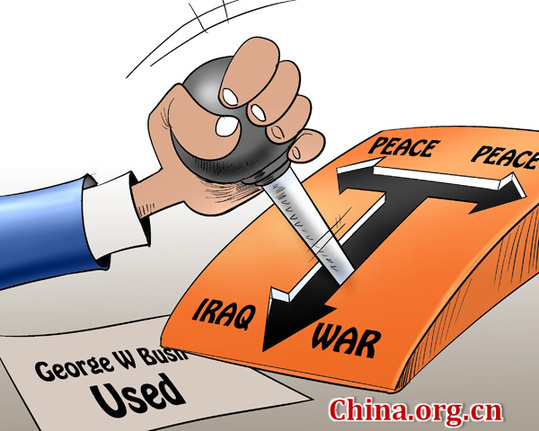Three Iraq wars
- By Zhao Jinglun
 0 Comment(s)
0 Comment(s) Print
Print E-mail China.org.cn, September 25, 2014
E-mail China.org.cn, September 25, 2014
U.S. Secretary of State John Kerry brags about a growing list of nations prepared to strike against the Sunni militants, aka. the Islamic State (IS).
|
|
|
[By Jiao Haiyang/China.org.cn] |
But this much vaunted coalition cannot compare with the one put together by George H. W. Bush's Secretary of State James Baker, who solidified strong allied participation. As a result, the first Gulf (Iraq) War -- "Desert Storm" of 1991, blessed by United Nations Security Council resolution, routed Saddam Hussein's forces in a fierce ground war that lasted just 100 hours. The first Iraq War was the most legitimate and successful.
READ: Obama can neither cure the symptom nor eradicate the roots
In contrast, the fight against the Islamic State, which some have dubbed the third Iraq War, also has UN backing, but enjoys much less support from allies or other coalition members. Only French President Hollande sent a couple of Rafale-M fighter aircraft to join the air strike against IS targets.
What is more serious, differences within the U.S. national security establishment were brought into the open, with the Chairman of the Joint Chiefs of Staff General Martin Dempsey saying he may recommend combat ground troops against the IS, and President Obama insisting there would be "no ground troops" and "no combat troops?".
In a year of mid-term elections, Obama is constrained by his campaign promises and the public opposition to further fighting in Iraq. But he is also under pressure from the political elite, the neoconservatives and part of the military, who want to commit boots on the ground.
Speaking of ground troops, Iraqi Prime Minister al-Abadi rejected ground troops from the United States or any other country in Iraq. Still, he is being criticized for welcoming foreign intervention by Hadi al-Amiri, head of the Iran-backed Badr Corps, a major Shiite militia, as well as the Bloc of the Free (al-Ahrar) led by Shiite cleric Sayyid Muqtada al-Sadr, and Asa'ib Ahl al-Haqq. Thousands of al-Sadr's followers staged a rally in Baghdad on Sept. 20 against the U.S. military campaign in Iraq.






